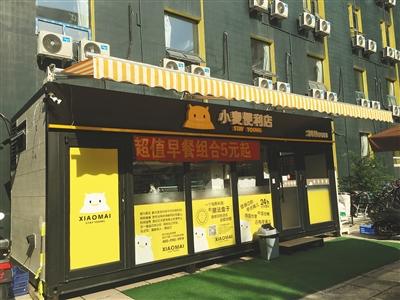The "face scanning" technology is still unstable, and it is difficult for more than 20 people to monitor; RFID technology is easily destroyed; the QR code application experience is poor; unmanned convenience stores are generally still in the experimental stage.
Unmanned convenience stores in Shanghai, Hangzhou and other places have attracted widespread attention, and unmanned retail in Beijing is also quietly emerging. Yesterday, it was learned that EATBOX, a new unmanned retail store, will open in Beijing on July 16. It is understood that there are currently 24 unmanned convenience stores such as Aigou and Xiaomai in Beijing.
However, maturity is still a problem in unmanned convenience stores that are optimistic about by various capitals. Recently, Binguo Box in Shanghai was suspended due to high temperatures, indicating that this new product is still inadequate. Some industry insiders said that although capital is optimistic about unmanned retail, unmanned retail is still in a market selection process. There are reports that divide domestic unmanned retail technology into artificial intelligence routes represented by machine vision; Internet of Things routes based on RFID; and mobile Internet routes based on QR codes. At present, high-end machine vision technology has stability problems, RFID technology has problems that are prone to damage, and QR codes have cumbersome transactions and poor experience. At the same time, the first two also have a well-known problem: cost.

Limitations of three technologies for unmanned retail
Regarding the current form of unmanned convenience stores on the market, some media have divided them according to three levels: cutting-edge technologies such as machine vision, RFID tag technology, QR code, and barcode recognition, but in reality, there is a situation where multi-level technologies are used in stores.
The practice of Binguo Box's once proud outdoor boxes to replace shops and reduce rents is becoming one of its pain points. The box in Shanghai has recently experienced "heat stroke". The donuts, chocolates, etc. in the store have been closed due to the high temperature in the store. An industry insider analyzed to the reporter, "This is a basic issue. In the early design, we should consider that there may be circuit factors when encountering such situations, and it may be still under debugging."
In addition, the RFID tags used in some stores face high cost problems. An industry insider said in an interview that if you purchase 100,000 RFID tags at one time, each cost is about 0.65 yuan, which is a considerable expense for convenience stores with an average customer price of 10 yuan.
In addition, similar to QR codes, if the label is stuck outside, there is a risk of being torn. The ideal situation is to be stuck inside the product, which requires a complete transformation of the supply chain, which is more difficult in reality.
The easiest QR code transaction is believed by industry insiders. Although the identification and anti-theft of goods are more advantageous, the technology is relatively mature, and the cost is relatively low, the shopping process is cumbersome and the experience is not much different from traditional retail.
The core competitiveness of convenience stores is not "unmanned"
The wheat smart convenience store located in Qiaoyou+ Community, Suzhou, Beijing is one of the stores trial operation by the wheat commune. At present, the store has implemented some unattended technologies such as facial recognition, scanning code payment, etc. After customers take photos, upload and register on the WeChat client for the first time, they can scan their faces and enter next time they visit.
In addition to selling snacks, beverages and daily chemicals, the store also has hot foods such as buns and freshly ground soy milk. Customers can also scan the QR code at the door to enter the discussion group established by the merchant to express new categories to the merchant. Some consumers encounter difficulties in scanning codes to pay, and the staff on site will help.
Most practitioners interviewed said that the existing technology still needs to mature, but unmanned convenience stores are ultimately the retail industry . No matter how "black technology" attracts attention, for consumers, high-quality and rich products are the core.
The most important value of the unmanned retail format is not "unmanned", but relying on technology to track and record behavioral data in the store, making the product structure of the store more "understandable".
At present, unmanned convenience stores are still in the experimental stage overall and have a lot of room for imagination, but we must be careful of "fictional fire". Convenience stores are ultimately retail business, and the design and management of the supply chain are still the key to success or failure. In the current situation where technological development is not yet perfect, "manual service + self-service" may be one of the more pragmatic practices.
Thank you for your attention and support to Laogao Crown Club . Please indicate the source for reprinting by Xuanming Network www.shxuanming.net
Click to register to apply to join the well-known e-commerce network - Laogao Crown Club. Any businesses, Tmall merchants, Taobao Crown Stores, Jinguan Stores, and other e-commerce platform merchants can apply to join!







 EN
EN CN
CN
